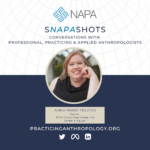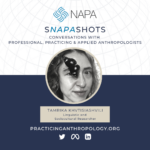sNAPAshots: Anahid Matossian

This work is licensed under a Creative Commons Attribution-NonCommercial-ShareAlike 4.0 International License.
Trigger Warnings – presenter discusses atrocity prevention, and briefly delineates categories of atrocities that their work addresses.
Transcript
Interviewer 0:00
[On Screen Image: NAPA Logo] Welcome to season three of sNAPAshots: Conversations with Practicing, Professional and Applied Anthropologists. Let’s meet our next guest.
Anahid Matossian 0:10
Hi, my name is Dr. Anahid Matossian. I am a lead technical advisor for the US State Department. I’m a gender advisor and I also work on atrocity prevention.
Interviewer 0:28
How did you get interested in anthropology?
Anahid Matossian 0:32
I would say it started from my second year of college. So I guess that would be sophomore year, just sitting in a classroom and listening to my professor talked about how he was able to go to Brazil, and go to random villages iand interview people. And I thought I wanted to get paid to travel and talk to people. That was my primary motivation for pursuing anthropology. And I also wanted to add that I got into working on gender and security issues, in particular, because I grew up listening to family stories about fleeing from the Armenian Genocide, Lebanese civil war, Syrian conflicts, I just felt like growing up hearing those stories around the kitchen table, and these were the nicest, warmest people you’ll ever meet. And they’ve been through these horrible traumas. So I was interested in capturing their stories. So that’s how I got introduced to oral history as well.
Interviewer 1:28
How has the anthropological perspective enhanced your contribution to your workplace?
Anahid Matossian 1:33
The first thing I can think of is empathy. So I’m able because I have these personal experiences growing up, I’m able to work carefully listen to what is being asked of us on the federal government level. And it’s really hard to like separate the personal and the professional. And I have to check myself repeatedly to not be too involved or too emotional about topics, especially working on genocide, or mass rapes, for example, you have to continually check yourself buy-in some kind of mental health resources. And yeah, just keep an open mind. But it has enhanced my contribution to my workplace by being able to be empathetic, being able to offer a hug if appropriate, whereas that was easier in graduate school where we didn’t have a lot of restrictions as I do in the federal government. Whereas now, it just means you’re able to listen, you’re able to try to understand the other perspective, and use that to inform policy.
Interviewer 2:45
What types of challenges do you experience as a practicing anthropologist?
Anahid Matossian 2:51
Something that’s helped me working with all these different sectors within this security space is thinking about the background and my co workers and trying to understand where they’re coming from, and communicating my background as well. So not being able to, I mean, not being afraid, of hiding my background at all, I’ve certainly face challenges. But my past work at the Marine Corps, in some instances, like my general team was extremely supportive. And they were comprised of Marine Corps officers and other fellow PhDs. So I mean, we did face some obstacles and trying to get across why anthropology or gender is important and why you should pay attention to it and why it’s relevant for the security space. And even now, I’m still having to…It’s an uphill battle, trying to explain why gender is important in the policy space. But there is more traction. And I only find that I get more traction by me putting aside my judgments and biases and being able to listen to them, because then they don’t have a lot of ammunition against you. They feel like I’ve really tried to understand where you’re coming from, what are the key things we could all agree on, which is Civilian Security, which is, which does have bipartisan support for especially for women, peace, and security. And that has meant the same thing of the security space as well as in terms of the military. So I think that is how I’ve been able to use anthropology to tackle obstacles, but it certainly is not easy. And I don’t want to make it seem like it is.
Interviewer 4:30
What skills do you use as an anthropologist?
Anahid Matossian 4:34
So my day to day work focuses a lot on interagency policy coordination. So it’s a lot of sitting, sitting in on meetings and shooting emails to the people who need to get those emails. But there are times where I’m able to go on assessments, for law enforcement assessments, and look at the criminal justice system. For many different countries that we support. I won’t name them here, but and see where anthropology plays a role, especially in terms of gender security, seeing how criminal justice systems both support, or work against gender based violence, or actually perpetuate gender based violence. So my anthropological skills included a lot of background research into why criminal justice systems are the way they are, it requires trying to understand the background of those cultural system, those criminal justice systems, and how it informs the present criminal justice systems. So background research, basic diving into knowing what kind of resources to delve into, and as well as interview skills, certainly coming into focus at that, especially working with this is something that I realized during assessments working for the federal government, is I realized that there is a dichotomy between working as a practitioner for the federal government and also the ability that I had as a graduate student. So as a graduate student doing field research, I was able to ask basically, almost any question I wanted, I was able to work with Syrian refugee women more intimate spaces and hug them if they needed to cry, and just be in a more emotional space. Whereas now I have a formal official role to play. And you can’t be that emotional, you have to kind of keep an arm’s length away from people. But my interview skills also came into focus, especially working with vulnerable populations, because I had, like a good decade of experience doing conducting interviews in these vulnerable populations. So that really prepared me and also being the only female on the team, I think it helped me, help set me up for success in a way that my male colleagues, even though they were extremely supportive and helpful, they weren’t able to access the same data in the way that I was.
Interviewer 7:01
Was there a moment that changed the way you practiced anthropology?
Anahid Matossian 7:07
I think it would be after working with the Marine Corps and learning how to change, I think, read the environment better. Like it changed the way I walked the way I dress. There were times where I felt like I had to change myself in order to fit in. But there were also times where I learned how to own who I was, and see the value of working in this environment, find key allies that I could work with. And I want to reiterate that most people I worked with, I really had a wonderful experience at them. So I think that pivotal moment where, especially for women working in this space is a hard balance between it’s a hard way to toe the line between being yourself, and what you believe in and also trying to fit in as well. That was a pivotal moment for me was learning how to be independent, and also toe the line between me, as expert and also not diminishing yourself and diminishing your expertise. It’s a work in progress for me.
Interviewer 8:09
What advice would you like to pass on to future anthropologists seeking roles and professional fields?
Anahid Matossian 8:16
Yeah, I also want to add a point that I am a neurodivergent anthropologist, I have ADHD, and it is something that has been continuously repressed or told that I can’t succeed with that. So I think it’s something I want to encourage, particularly neurodivergent anthropologists that you can. And for everyone, as well, I want to add that if you follow your passions, as cheesy as it sounds like you’re able to find jobs that genuinely interest you like this current job, I couldn’t be happier working on this topic, even though it is super depressing at times. And I did need mental health breaks. Like for me that would be hiking, or spending time outside. And another point I want to add is the value of networking, like a former professor of mine was Riall Nolan at Purdue, and he gave really impressive and important advice about not being afraid to reach out to people to find informational interviews, like it’s a skill that you will have the rest of your life. And it’s a skill that I’m needing now as well. And I want to give an example that, by networking with someone on LinkedIn, I found another anthropologist working on gender and security issues. She now is a really good friend of mine in the DC area. And she also got me my first wait second job actually worked with the Marine Corps.
Interviewer 9:40
Thanks for sharing your experience as a practicing sociocultural anthropologist. For more snapshots, find us at PracticingAnthropology.org, Meta, LinkedIn, and X.
Anahid Matossian 10:00
[Outtakes] Also being open about that. I’m sorry what was your question again? I feel like I’m doing the opposite of what my advisor told me to, which I think is actually a good thing. By going against the advice, I’m able to succeed in terms of being flexible about different work environments, in terms of publishing my book, my dissertation into a book, in terms of just not holding back and that don’t be afraid to reach out, like if anyone watches this and they’re interested in talking to me, they’re welcome to reach out. It’s a resource that I wish I had when I was transitioning from academia to practice. And I would encourage other practitioners as well to embrace mentorship and talk to others. Yeah, so don’t be afraid to reach out the worst that can happen if someone says no, I don’t want to talk to you, but I can tell you right now, I won’t say no. So I encourage you to do that.
Credits 10:52
PRODUCED BY Niel Tashima Cathleen Crain Joshua Liggett
DIRECTED BY Reshama Damle Suanna Crowley
MUSIC BY by Infinite Audio “Chill Groove Background”
CREATIVE ASST. Juana Lozano
Many Thanks to NAPA’s Governing Council for supporting sNAPAshots Conversations with Practicing, Professional, and Applied Anthropologists
NAPA is a section of the American Anthropological Association
NAPA is seeking volunteers to join the sNAPAshots project. We’d love to hear from YOU!
Contact us at: ntashima@ ltgassociates.com
Transcribed by https://otter.ai



